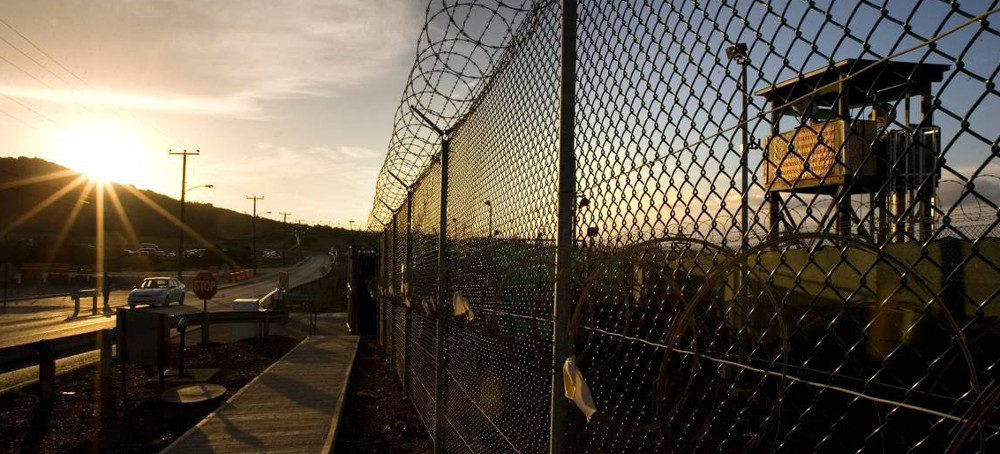Tougher Security Measures Are Causing Upset at Guantánamo Prison
Carol Rosenberg The New York Times An effort to unshackle a detainee during legal meetings has put a spotlight on simmering tensions in the Pentagon’s secretive prison. (photo: AP)
An effort to unshackle a detainee during legal meetings has put a spotlight on simmering tensions in the Pentagon’s secretive prison. (photo: AP)
An effort to unshackle a detainee during legal meetings has put a spotlight on simmering tensions in the Pentagon’s secretive prison.
Guards let the man, Abd al-Rahim al-Nashiri, meet his lawyers more than 150 times while he was unshackled from 2019 until late last year, said Lt. Cmdr. Alaric Piette, the defense lawyer. Now the change has re-traumatized the prisoner and impeded his lawyers’ ability to communicate and work with him.
“We are asking to be in the room with him unshackled as we were for four and a half years,” Commander Piette said. “To do otherwise would be to exacerbate the torture that Mr. Nashiri went through at the hands of the government.”
Through their lawyers, some of the 30 prisoners at Guantánamo Bay have complained that the military police who guard them recently resumed more stringent practices that had been abandoned over the years.
Details have been scant because some of the security measures are probably classified. When the new prison commander, Col. Steven Kane, defended his practices in testimony at the war court on Monday, Mr. Nashiri’s judge, Col. Matthew S. Fitzgerald, closed the court to the defendant and the public.
In court on Tuesday, a prosecutor, Capt. Kyle P. Lanning, did not explain the reason for the renewed policy of shackling prisoners during legal meetings but urged the judge to defer to the prison commander.
Captain Lanning cited a 2014 federal appeals court ruling that permitted Guantánamo guards to routinely use their hands to search the prisoners’ genitals before legal meetings, a practice lawyers said effectively ended the meetings. The prison has since acquired scanning equipment for less intrusive searches.
Colonel Fitzgerald, however, noted on Tuesday that the military judge in the Sept. 11 case had recently ordered the prison to unshackle those defendants during their legal meetings at the war court compound. He invoked the “well-protected constitutional right of effective assistance of counsel” and said he was inclined to grant the request in the Cole case, Guantánamo’s other death penalty prosecution.
He added that Colonel Kane testified during the closed session that he was obeying the order in the Sept. 11 case.
Seventeen sailors were killed in the bombing of the U.S. Navy destroyer off Yemen on Oct. 12, 2000.
The shackling question is the first torture-related issue to confront the new Cole case judge, Colonel Fitzgerald. Last year, the previous judge threw out confessions Mr. Nashiri made at Guantánamo in 2007 as tainted by the prisoner’s brutal treatment in the agency’s overseas prison network. He was held at C.I.A. black sites from 2002 from 2006.
Mr. Nashiri was waterboarded by psychologists working as contractors for the C.I.A., held naked and shackled in painful “stress positions,” and subjected to threats and violence, including rectal abuse, by agency staff members. A court-ordered military medical assessment found that, as a result of his abuse, he suffers from complex post-traumatic stress disorder, depression and other conditions.
Commander Piette, who has represented Mr. Nashiri longer than any other member of his current defense team, said the resumption of shackling had harmed the prisoner’s ability to communicate with his lawyers because of a “cognitive change” triggered by his PTSD. To effectively represent him, Commander Piette said, Mr. Nashiri “has to trust his American lawyers, American lawyers dressed like me.”
While still murky, the problems at the prison first surfaced earlier this year when all four defendants in the Sept. 11 case, including Khalid Shaikh Mohammed, who is accused of being the mastermind of the attacks, chose not to come to weeks of pretrial hearings. Although they have the right to voluntarily waive their attendance before the trial actually begins, they were essentially engaging in a boycott.
In court last month, Denny LeBoeuf, a lawyer for Mr. Mohammed, protested to the judge, Col. Matthew N. McCall, that the prisoners had experienced “a level of upset and uproar from conditions at the camp and the transportation and meeting problems that is unprecedented in my experience.” She has been on the case since 2008.



